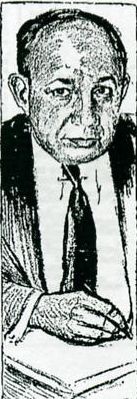|
Donald Randall Richberg
Richberg took up the practice of law in Chicago with his father, practicing as the firm of Richberg & Richberg. Harold L. Ickes joined the firm in 1913 and the firm name was changed to Richberg, Ickes & Richberg. The senior Richberg gave up the practice of law in 1915 due to illness and Morgan Davies and John S. Lord joined the firm and was renamed, Richberg, Ickes, Davies & Lord. Increasingly involved as a lawyer for labor unions and with various political and social reform movements, he left the firm in 1923 to practice on his own until 1933. In 1933, President Franklin D. Roosevelt appointed Richberg general counsel of the NRA (National Recovery Administration) and he took up residence in Washington, D.C. Richberg took a leave of absence from the NRA on June 30, 1934 to accept presidential appointment as director of the newly created Industrial Emergency Committee. After appointment to undertake a reorganization of the NRA h was appointed chairman of the NRA Board. He resigned from the NRA Board on June 16, 1935 and undertook the writing of a book on the NRA. In 1936 Richberg joined a Washington, D.C. law firm, at which he remained for the rest of his life. During his career, Richberg wrote on various subjects, including novels and poetry. [Source: The National Cyclopaedia of American Biography 623-625 (New York: James T. White & Company, 1966)] [The photo of Richberg is from Richberg Now F.D.R.'s Proxy in Wsahington: Lifelong Chapion of Labor Attains Trusted Postion," Amarillo Sunday News and Globe, July 29, 1934, p.5, c1.] Poetry Donald R. Richberg, Old Faith and Fancies New (Charlottesville, Virginia: Jarman Press, 1949) _______________, More Faith and Fancies; a 1955 Supplement to "Old Faith and Fancies New" of 1949 ([Charlottesville, Virginia]: Jarman Press, 1955) _______________, Poems of Donald R. Richberg ([s.i.]: American Natural Gas Company, 1959) Poetry: The Green Bag Donald Richberg, "Precedents," 17 The Green Bag 710 (1905) _____________, "A Legal Nightmare," 18 The Green Bag 54 (1906) Writings Donald R. Richberg, The Shadow Men (Chicago: Forbes & Company, 1911)(novel) _______________, In the Dark (Chicago: Forbes & Company, 1912)(novel) _______________, Progressive Congressional Program (New York: city, Progressive National Service, 1914) _______________, Who Wins in November? The "Inside politics" that will decide the Presidency in 1916 (Chicago: F.J. Drake, 1916) _______________, A Man of Purpose (New York: Thomas Y. Crowell Company, 1922)( New York: Thomas Y. Crowell Company, 1934)(novel) _______________, Tents of the Mighty (New York/Chicago: Willett, Clark & Colby, 1930) _______________, Laborism in this Changing World (Chicago: Barnard & Miller Print, 1932) _______________, The Rainbow; After the Sunshine of Prosperity, the Deluge of the Depression, the Rainbow of the NRA, What Have We Learned? Where Are We Going? (Garden City, New York: Doubleday, Doran & Company, 1936) ________________, Guilty! The Confession of Franklin D. Roosevelt (Garden City, New York: Doubleday, Doran, 1936) _______________, Government and Business Tomorrow, a Public Relations Program (New York: Harper & Brothers, 1943) ________________, Nor Can Government; Analysis and Criticsm of S. 984- "A bill to prohibit discrimination in employment because of race, religion, color, national origin, or ancestry" ([New York]: National Industrial Conference Board, 1948) ________________, Where is Organized Labor Going? ([New York]: National Industrial Conference Board, 1949) _______________, When Big Labor and Big Government Strike Hands (New York: National Industrial Conference Board, 1950) _______________, The Murder of a Candidate (Evanston, Illinois: National Small Business Men's Association, 1952) _______________, My Hero; the Indiscreet Memoirs of an Eventful but Unheroic Life (New York: Putnam, 1954) _______________, Labor Union Monopoly, a Clear and Present Danger (Chicago: H. Regnery Co., 1957)(New York: Distributed by Constitution and Free Enterprise Foundation by special arrangement with the publishers H. Regenery Co., Chicago, 1957)(New Rochelle, New York: America's Future, 1958)(Chicago: H. Regnery Co., 1965) _______________, Only the Brave are Free: A Condensed Review of the Growth of Self-government in America (Caldwell, Idaho: Caxton Printers, 1958)(with co-author Albert Britt) ________________, The Mexican Oil Seizure: Donald R. Richberg's Story (New York: Arrow Press, 1940) ________________, G. Hovah Explains (Washington:
National Home Library Foundation 1970)(novel) Research Resources Donald Randall Richberg Papers Alan Brinkley, The End of Reform: New Deal Liberalism
in Recession |
